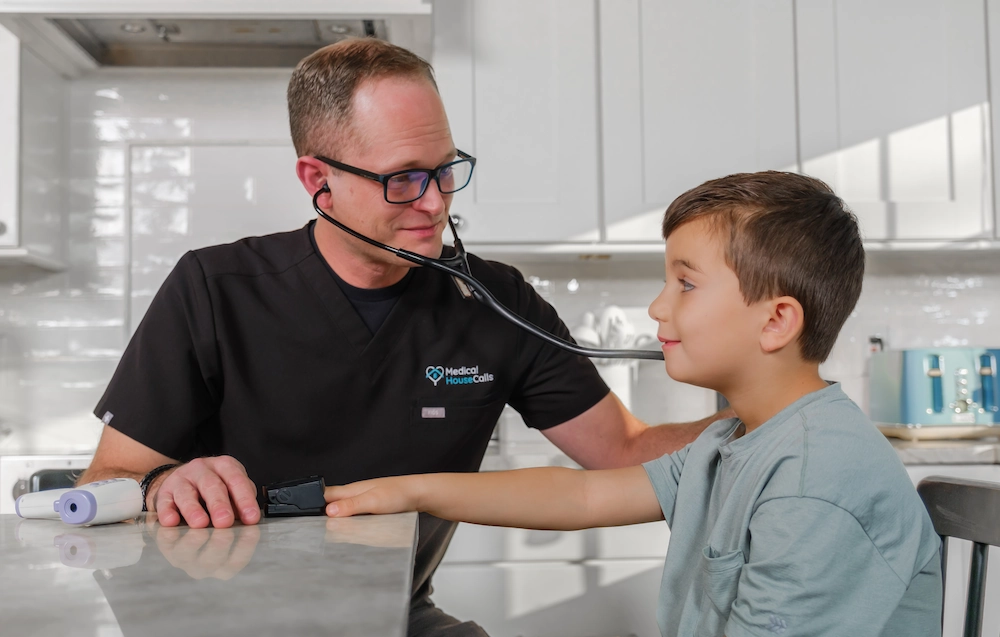Table of Contents
Beyond Aloe: Sun Poisoning Treatment at Home
As the sun’s warm embrace beckons us outdoors, its rays also carry the potential for sun poisoning, a painful and often underestimated condition. However, relief can be found within the comforts of your home with Medical House Calls. From soothing remedies to practical tips, discover effective sun poisoning treatment at home to alleviate sunburn symptoms and promote healing naturally.

Urgent Care, Right at Home
Understanding Sun Poisoning
Sun poisoning, also known as severe sunburn or photodermatitis, can occur when our skin is exposed to excessive sunlight, particularly during peak hours. Here’s a breakdown of this condition’s symptoms, causes, and prevention methods.
Symptoms of Sun Poisoning
- Severe sunburn: Redness, pain, and blistering of the affected area.
- Swelling and inflammation: Skin may become swollen, tender, and warm to the touch.
- Itching and irritation: Itching and discomfort may accompany sunburned skin.
- Headache and fever: In severe cases, sun poisoning can lead to headaches, fever, and nausea.
- Dehydration: Prolonged sun exposure can cause dehydration, leading to symptoms such as thirst and fatigue.
- Sun rash: Some individuals may develop a sun rash (polymorphous light eruption) characterized by itchy or red patches.
Causes of Sun Poisoning
- UV radiation: Exposure to ultraviolet (UV) radiation from the sun damages the skin cells, triggering inflammation and sunburn.
- Sun sensitivity: Certain individuals may be more susceptible due to their skin type, medications, or medical conditions that increase sensitivity to sunlight.
- Prolonged exposure: Spending extended periods in the sun without protection increases the risk of sunburn.
- Reflective surfaces: Surfaces like water, sand, and snow can reflect UV rays, intensifying sun exposure.
- Medications: Some medications, including antibiotics, diuretics, and acne treatments, can increase sensitivity to sunlight.
- Lack of sunscreen: Failure to use sunscreen with sufficient SPF and broad-spectrum protection makes our skin vulnerable to sunburn.
Initial First Aid Measures
These first aid measures are intended to provide immediate relief and promote healing in the early stages of sun poisoning.
- Cooling Down:
- Move to a shaded or cool area to prevent further sun exposure.
- Take a cool shower or bath to lower the body temperature and soothe the skin.
- Apply towels soaked in cold water to affected areas.
- Avoid using ice on the skin, as it can cause further irritation.
- Hydrating the Body:
- Drink plenty of water to replenish fluids lost through sun exposure.
- Avoid alcoholic beverages and caffeinated drinks, as they can contribute to dehydration.
- Consume electrolyte-rich fluids such as sports drinks or coconut water.
- Utilize IV Therapy for efficient and effective replenishment of your body with lost fluids, electrolytes, nutrients, and more.
- Soothing Sunburned Skin:
- Apply aloe vera gel or lotion to soothe inflammation and promote healing.
- Use moisturizers containing ingredients like oatmeal or hyaluronic acid.
- Take over-the-counter pain relievers such as ibuprofen or acetaminophen.
- Avoid further irritation by wearing loose, breathable clothing and avoiding harsh soaps or scented products.
- Consider applying hydrocortisone cream to reduce irritation, but use it sparingly and as a healthcare professional directs.

Treating Sun Poisoning
While over-the-counter and home remedies can relieve mild to moderate cases of sun poisoning, seek medical attention if you experience symptoms such as blistering, fever, chills, dizziness, or confusion. Severe sunburns require medical treatment to prevent complications.
Over-the-Counter Remedies
- Nonsteroidal anti-inflammatory drugs (NSAIDs): Over-the-counter pain relievers such as ibuprofen (Advil, Motrin) or naproxen (Aleve) can help reduce pain, inflammation, and fever. Follow the dosage instructions on the packaging and consult a healthcare professional if you have concerns.
- Topical hydrocortisone cream: Hydrocortisone cream can alleviate itching and inflammation. Apply a thin layer to affected areas as directed on the packaging, and avoid using it on broken or blistered skin.
- Aloe vera gel: Aloe vera has soothing and anti-inflammatory properties. Apply pure aloe vera gel to affected areas several times a day to hydrate the skin and promote healing.
- Moisturizing lotions or creams: Choose a fragrance-free moisturizer containing ingredients like ceramides, hyaluronic acid, or colloidal oatmeal. Apply to affected areas as needed.
Home Remedies for Sun Poisoning
- Cool compresses: Apply cool towels to reduce discomfort. Avoid using ice on the skin to avoid complications.
- Oatmeal baths: Adding colloidal oatmeal to a lukewarm bath can soothe sunburned skin and relieve itching and inflammation. Soak for 15-20 minutes and gently pat the skin dry afterward.
- Vinegar compresses: Dilute white vinegar with water and apply the solution using a soft cloth. Vinegar has a cooling effect and may alleviate discomfort.
- Tea bags: Brew a pot of black tea and allow the tea bags to cool in the refrigerator. Apply to sunburned areas for a soothing and anti-inflammatory effect.
- Honey: Apply some honey to sunburned skin to moisturize, reduce inflammation, and promote healing. Rinse with cool water after 15-20 minutes.
- Baking soda paste: Mix baking soda with water for natural relief. Baking soda can soothe itching, reduce inflammation, and balance the skin’s pH.
Prevention Tips
Incorporating the following tips into your routine can minimize your risk of sunburn, sun poisoning, and long-term skin damage while enjoying the outdoors safely.
- Use sunscreen: Before going outdoors, apply a broad-spectrum sunscreen with SPF 30 or higher to all exposed skin, including your face, neck, ears, and hands. Reapply sunscreen every two hours or more frequently if swimming or exercising.
- Seek shade: Limit sun exposure during peak hours, often between 10 a.m. and 4 p.m., when UV radiation is most potent. When possible, seek shade under trees, umbrellas, or other sheltered areas.
- Wear protective clothing: Cover yourself with lightweight, long-sleeved shirts, pants, wide-brimmed hats, and sunglasses that offer UV protection. Tightly woven fabrics provide better protection against UV rays.
- Avoid reflective surfaces: Surfaces like water, sand, snow, and concrete can intensify UV radiation, increasing the risk of sunburn. Wear sunscreen and protective clothing even in shaded areas near reflective surfaces.
- Stay hydrated: Drink water throughout the day, especially when spending time outdoors. Dehydration can worsen sunburn and heat-related ailments.
- Check medication labels: Some medications, such as certain antibiotics, acne treatments, and diuretics, can increase the skin’s sensitivity to sunlight. Consult your healthcare provider to take appropriate precautions.
- Be vigilant near water and snow: Water activities and snow sports can increase exposure to UV radiation due to their reflective nature. Apply sunscreen, wear protective clothing, and reapply sunscreen more often when engaging in related activities.
- Protect your lips: Lips are often overlooked but can also suffer from sun damage. Apply a lip balm with SPF protection to prevent sunburn.
- Educate yourself about the UV index: The UV index provides information about the strength of UV radiation and helps you plan accordingly. Schedule outdoor activities when the UV index is lower, typically in the morning or late afternoon.
- Be proactive with children: Children are vulnerable to sunburn. Keep infants under six months out of direct sunlight, dress them in protective clothing, and use sunscreen on exposed skin. For older children, teach them sun safety practices and lead by example.
When to Seek Medical Attention
While most cases of sunburn and mild sun poisoning can be treated at home with over-the-counter remedies and self-care measures, seeking medical attention is essential if you experience severe symptoms or complications. Below are some instances in which you should consider medical help:
- Severe pain: If you experience pain not relieved by over-the-counter pain relievers and other symptoms, such as fever or chills, accompany the pain.
- Blistering: Severe sunburn with extensive blistering may require medical evaluation and treatment to prevent infection and promote healing.
- Fever and chills: Fever, nausea, and chills can be signs of heat-related illness and should be assessed by a healthcare provider.
- Dizziness or confusion: Feeling lightheaded or disoriented after sun exposure may indicate heat exhaustion or heatstroke, which requires immediate medical attention.
- Sunburn covering a large area: If a significant portion of your body is sunburned, especially if the burn is severe or accompanied by systemic problems, it’s advisable to consult a healthcare professional.
- Pre-existing health conditions: Individuals with compromised immune systems may be at higher risk of complications and should seek medical advice if they experience symptoms of sun poisoning.
Schedule an Appointment with Medical House Calls
Preventing sun poisoning begins with proactive safety measures, including using sunscreen, wearing protective clothing, and seeking shade during peak hours. If sunburn occurs, prompt first aid measures such as cooling the skin, hydrating the body, and soothing the skin can alleviate discomfort and promote healing. However, seeking medical attention is crucial if symptoms are severe or persistent.
If you require assistance, consider the convenience of Medical House Calls. With same-day and next-day appointments, our dedicated team provides personalized care that addresses your concerns. Stay safe and enjoy the sun responsibly.

Concierge Primary Care At Your Doorstep
Experience primary care without leaving your home. Join our waitlist today and enjoy healthcare tailored to your needs–comfortably and conveniently.


















